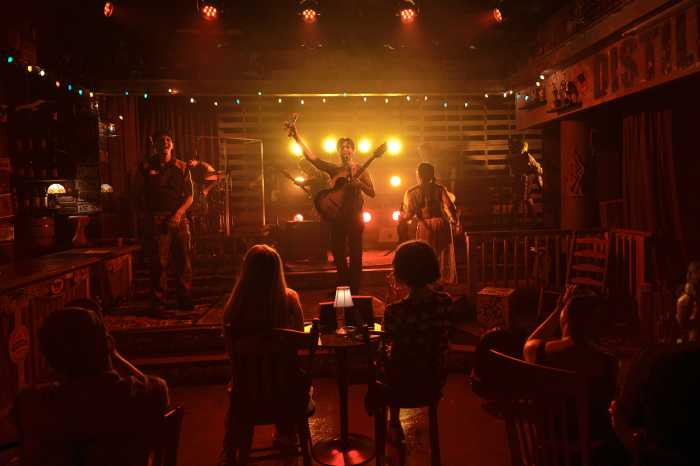By ROBERT J .BERENSON
Faster by Adam Rapp is an important new play served up with brilliance by director Darrell Larson and company.
In a grungy pit of a basement “reside” rough and tumble streetwise Skram, his retarded brother Stargyl, and the cool and starving Kitchin. Kitchin tenderly cares for Stargyl, curled up in the fetal position behind a phalanx of toy soldiers, while Skram periodically abuses him.
What a dank, dark spooky and yet realistic place it is—like the foreboding basement of a tenement. The eerie set by David Korins sets the stage for all the grisly things to come. The three squat in this hole which provides a bare minimum for their existence, a flickering naked light bulb, a cold water sink with possibly poisoned water, a few battered mattresses, and very occasional meals of skim milk and Count Chocula cereal, hustled on the street.
Milk cartons are everywhere, scattered around and lovingly made into a collage by tall, lanky and bewildered Stargyl (Robert Beitzel). The cartons also advertise missing children, and a padlocked room might hold a kidnapped child.
Skram and Stargyl have been abandoned by their mother and Skram takes out his hostility on his sibling. Stargyl amuses himself by playing with his toy soldiers. He lives in fear of darkness and abandonment. He does not speak, just moans and howls occasionally like a lost animal. His worldly possessions consist of a tiny stuffed animal, the toy soldiers, a pair of size thirteen, high-heeled sling back pumps, a comb, and a small pistol.
Much has to be said about the performance of Chris Messina as the street-wise elder brother and hustler who mesmerizes with a frenetic, sexually charged aggression. When he strips and masturbates with his back to the audience it strikes as a much needed release of excess energy. He’s a slob and-a-half, but his physicality is mesmerizing. Nothing he does is in half measures, from spritzing himself at the water tap, to shadow boxing an imaginary foe with a primal energy to slurping up a bowl of cereal in a pail like a crazed animal.
Loosely holding the trio together is the gentler, more intelligent Kitchen (Mtume Gant), whose hope exists on a vague recollection of religious schooling. He tries to keep old memories alive by reciting mangled versions of Psalm 23 and working at the local parish, though he claims it’s only because they have a big fan to thwart the heat wave “which has the sidewalks cracking.” His past and a dream of owning a Buick Electra are all that keep him going. When hope fails, he too, snaps in a cataclysmic immolation.
The play is a virtual minefield of metaphors, most of which center on Christian theology.
Fish (a major Christ image) are symbolically crucial to the plot. The little girl locked in the coal bin presents Stargyl with a fish which she takes from her body, Skram is forced to eat the fish(communion) by the sinister OZ (Roy Thinnes), aka The Man.
The Man (satan, antichrist, the wizard from OZ, a bit of FDR in a wheelchair), brilliantly recites a poem that tells of Skram and Stargyl’s past life. It is a mix of The Night Before Christmas and a hellish Hansel and Gretel complete with house eating! Thinnes is spellbinding. His dance of seduction with Skram (in a pair of calf-crunching 6 inch pumps) is a sight not quickly forgotten.
The play is somewhat reminiscent of This Thing of Darkness (coincidentally, also with Chris Messina) seen earlier this year. The plays juxtapose the effects of the world’s end on different economic classes: same effect, different trappings.
The language is a delightful blend of street talk and wonderfully crafted malapropisms somewhat Joycean: “The Lord is my Chevrolet; a Lincoln Clown Car; I’m starvin’ like Marvin; and President George Washingmachine who was gunned down by Oswego.” The background music consists of an anachronistic radio jingle for Florida orange juice, echoing a world long gone.

































